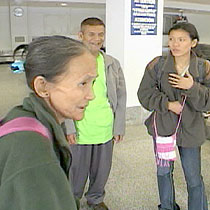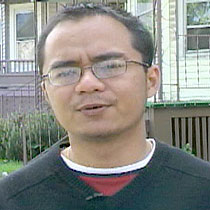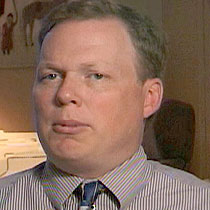-
(单词翻译:双击或拖选)
Utica, New York
05 September 2007
The exodus1 of minority populations in Burma is the largest migration2 of people in Southeast Asia. An estimated 160,000 live in nine refugee camps in Thailand. There, they wait for resettlement in a third country. Many come to the United States. VOA's Kane Farabaugh reports from one town in the northeastern state of New York that is welcoming thousands of Burmese refugees.
 |
| Aye Cha and his family arrive at the airport with plans to resettle in New York state |
They are now in New York State after a series of firsts -- first stay in a hotel room, first trip on an airplane and now, first time in a Western country.
They do not speak English, have little experience with life in a developed nation and have arrived with little more than the clothes on their backs.
As ethnic3 Karen, a minority group in Burma, Aye Cha and his family have spent most of their lives in the same rural village.
 |
| Daniel Cribb |
Aye Cha and his family are part of the growing population of Burmese Karen who now call Utica home.
In August, the Mohawk Valley Refugee Resource Center resettled 119 Burmese, mostly Karen. By next summer the center expects to settle more than 1,000 more.
Cribb says, "The Karen community [here] is the second largest community in the U.S., which is behind the Minnesota, St. Paul, so I think this is a good place for these new arrivals."
Within a year, if all goes well, Aye Cha and his family will have jobs, money, food and a place to live. But being here for the first time, far away from Burma and the village life they knew, is difficult.
"Being here is all so very new for them. Everything is -- the country, the language, everything is very new for them. So basically, I feel like it's my responsibility, my duty to help them," says Cribbs.
Settling into their new lives begins at home.
 |
| Peter Vogelaar |
The classroom is the next step in the integration process. English lessons at the Refugee Resource Center can last for months, even years.
The Refugee Resource Center also helps provide the refugees with many of their needs -- health care, employment and housing. But even with some language skills and assistance, it can be a daunting7 transition.
Aye Cha's wife Puay Paw is accustomed to providing food and other needs for her family. As the family makes its way from the airport to a new home in Utica, she is full of questions for Cribb.
"'How am I going to find food, how am I going to buy food?'” she asks Cribb. “These simple things -- I think they do know that there is going to be some greater challenges they're going to face ahead," he tells us.
Aye Cha and his family will not face them alone. They will have the support of a growing community of people just like themselves who have fled oppression in Burma
 收听单词发音
收听单词发音
1
exodus

|
|
| v.大批离去,成群外出 | |
参考例句: |
|
|
|
2
migration

|
|
| n.迁移,移居,(鸟类等的)迁徙 | |
参考例句: |
|
|
|
3
ethnic

|
|
| adj.人种的,种族的,异教徒的 | |
参考例句: |
|
|
|
4
stark

|
|
| adj.荒凉的;严酷的;完全的;adv.完全地 | |
参考例句: |
|
|
|
5
mutual

|
|
| adj.相互的,彼此的;共同的,共有的 | |
参考例句: |
|
|
|
6
integration

|
|
| n.一体化,联合,结合 | |
参考例句: |
|
|
|
7
daunting

|
|
| adj.使人畏缩的 | |
参考例句: |
|
|
|















